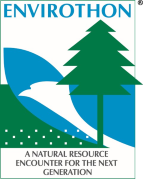Mission
NCF-Envirothon's mission is to educate students about the environment and conservation of natural resources through hands-on outdoor experiences, academic study, and collaborative competitions.
Vision
The vision of NCF-Envirothon is to equip students with the knowledge and skills to educate others, inspire action in their local communities, and promote a lifelong commitment to environmental stewardship and sustainability.
To accomplish its mission and vision, Envirothon strives to meet the following goals when students participate in Envirothon educational programming and academic competitions.
GOAL 1:
To promote a desire to learn more about the natural environment and equip students with the knowledge and skills needed to apply the basic principles and practices of resource management and ecology to complex environmental issues.
- Students should be able to demonstrate a basic knowledge of concepts in natural resource management and ecology, especially in the areas of soils/land use, aquatic ecology, forestry, wildlife, and current environmental issues.
- Students should be able to analyze aquatic, forestry, soils and land use, wildlife, and current environmental issues in problem-solving activities involving resource issues.
GOAL 2:
To promote stewardship of natural resources and to encourage the development of critical thinking, cooperative problem-solving, and decision-making skills required to achieve and maintain a natural balance between the quality of life and the quality of the environment.*
- Students should be able to identify environmental issues in a given situation and the various interests involved while considering ecological, social, and economic factors.
- Students should be able to investigate issues using primary and secondary information sources and synthesize the data gathered. Additionally, students should demonstrate the ability to: Listen with comprehension; Collect, organize, and analyze information; Frame appropriate questions to guide their investigation; Use a range of resources and technologies in addressing questions; and, Critically examine information from a variety of sources.
- Students should be able to assess the nature of information and materials from various viewpoints and evaluate their implications.
- Students should be able to identify alternative solutions for various issues and their associated value perspectives. They should be able to evaluate alternative solutions with respect to ecological and cultural implications. Additionally, the alternative solutions generated should attempt to take into consideration the variety of interests involved, while maintaining a healthy environment.
- Students should be able to identify and evaluate their position on environmental issues and their associated solutions. These positions should be based on balanced information, critical analysis, and careful synthesis. Moreover, students should be able to test their position against new information, personal experiences, and beliefs.
- Students should be able to evaluate the interaction of the proposed solution with other ecological and social factors, and anticipate having to plan ahead when evaluating the long and short-term implications of possible solutions to environmental problems.
GOAL 3:
To provide students with experience in environmentally-oriented activities, enabling them to become environmentally aware, action-oriented citizens.*
Students should know a wide range of action strategies involved in seeking solutions to environmental problems.
Students should know agencies and organizations that can be used as resources to seek solutions to environmental problems.
Students should be able to evaluate the impact of their actions affecting a particular environmental problem and devise alternative actions to work towards improving environmental conditions.
Students should be able to work independently and/or collaboratively to solve environmental problems.
*Adapted from the draft National Standards for Environmental Education (NAAEE), August 1995 draft.
